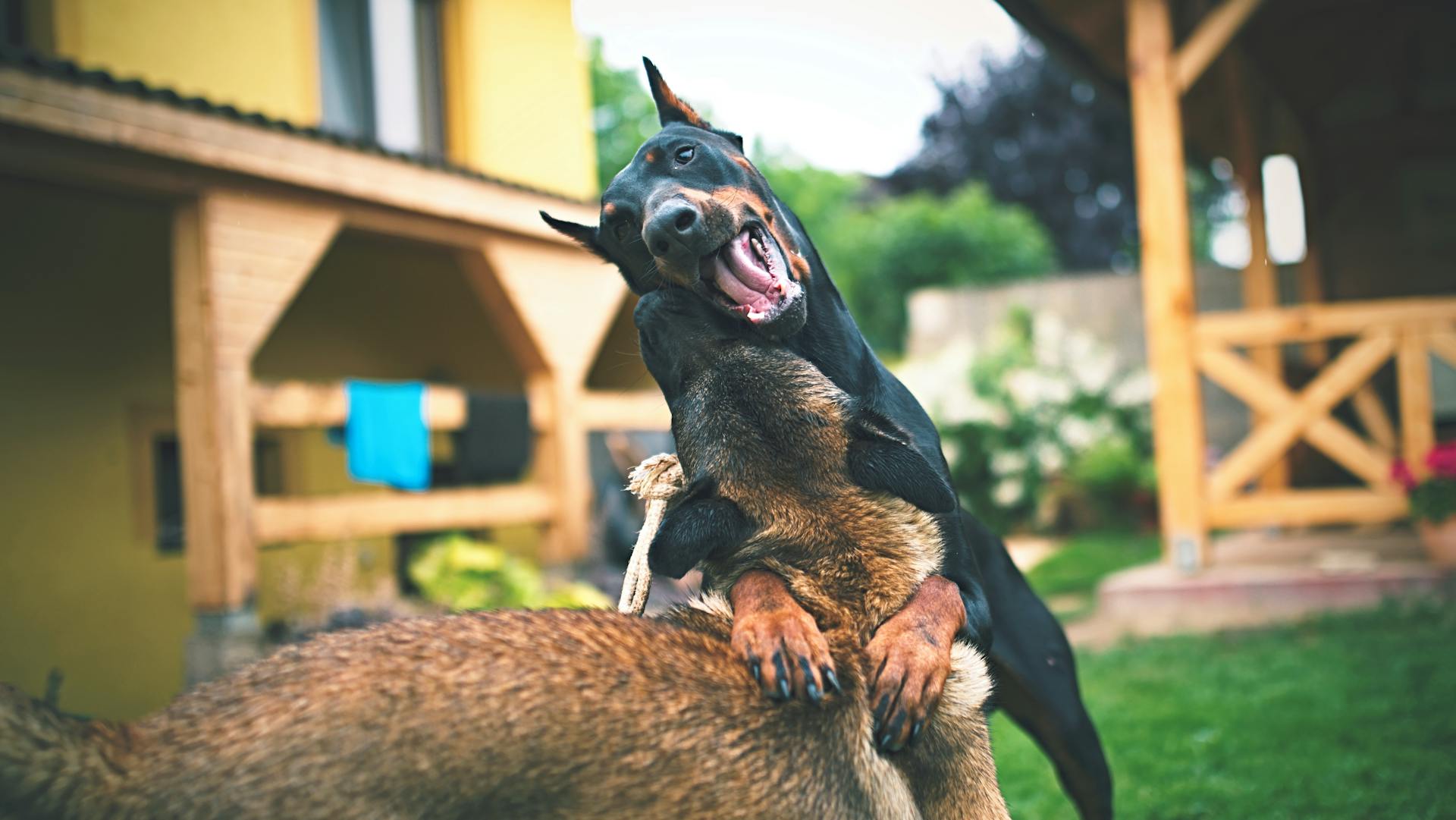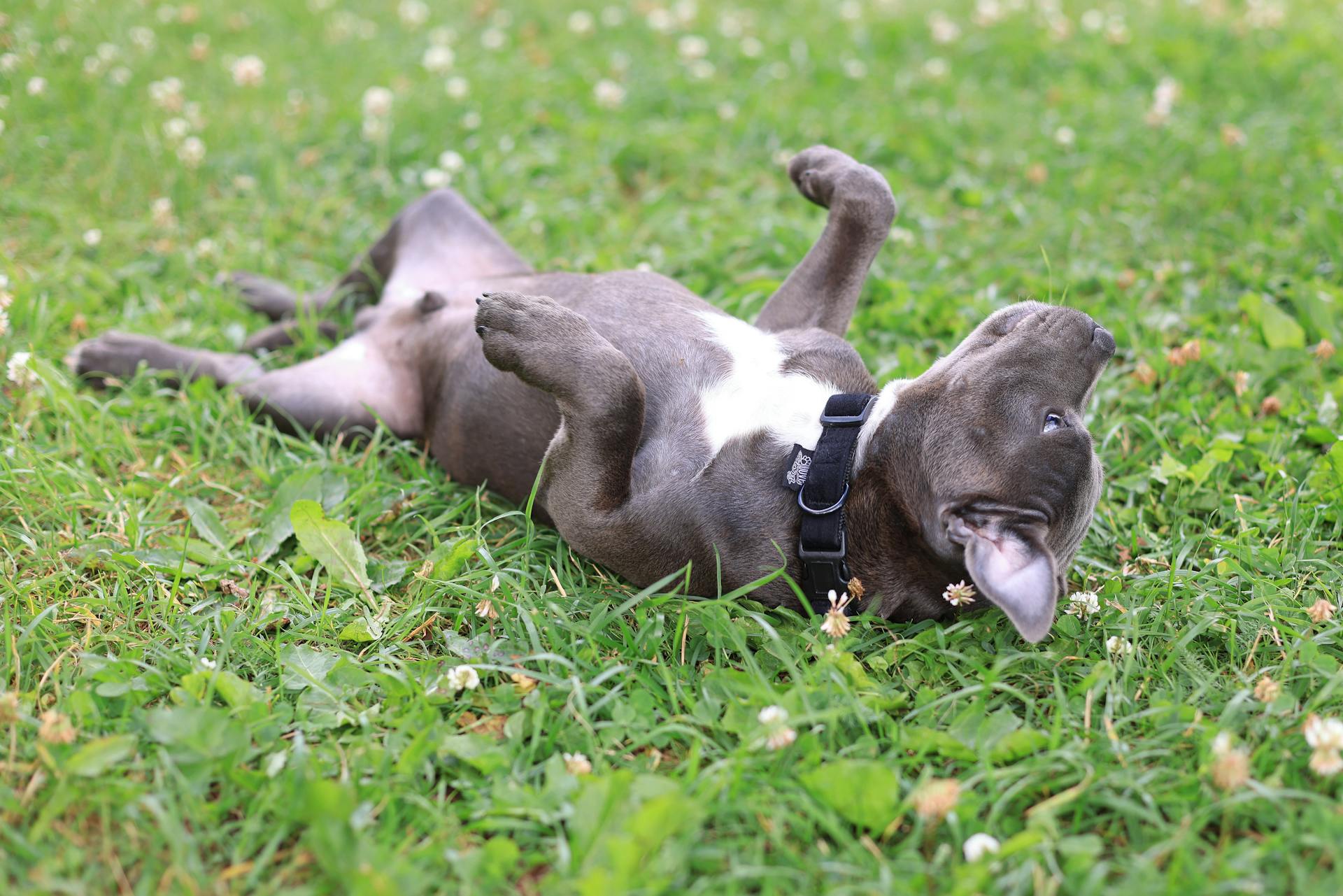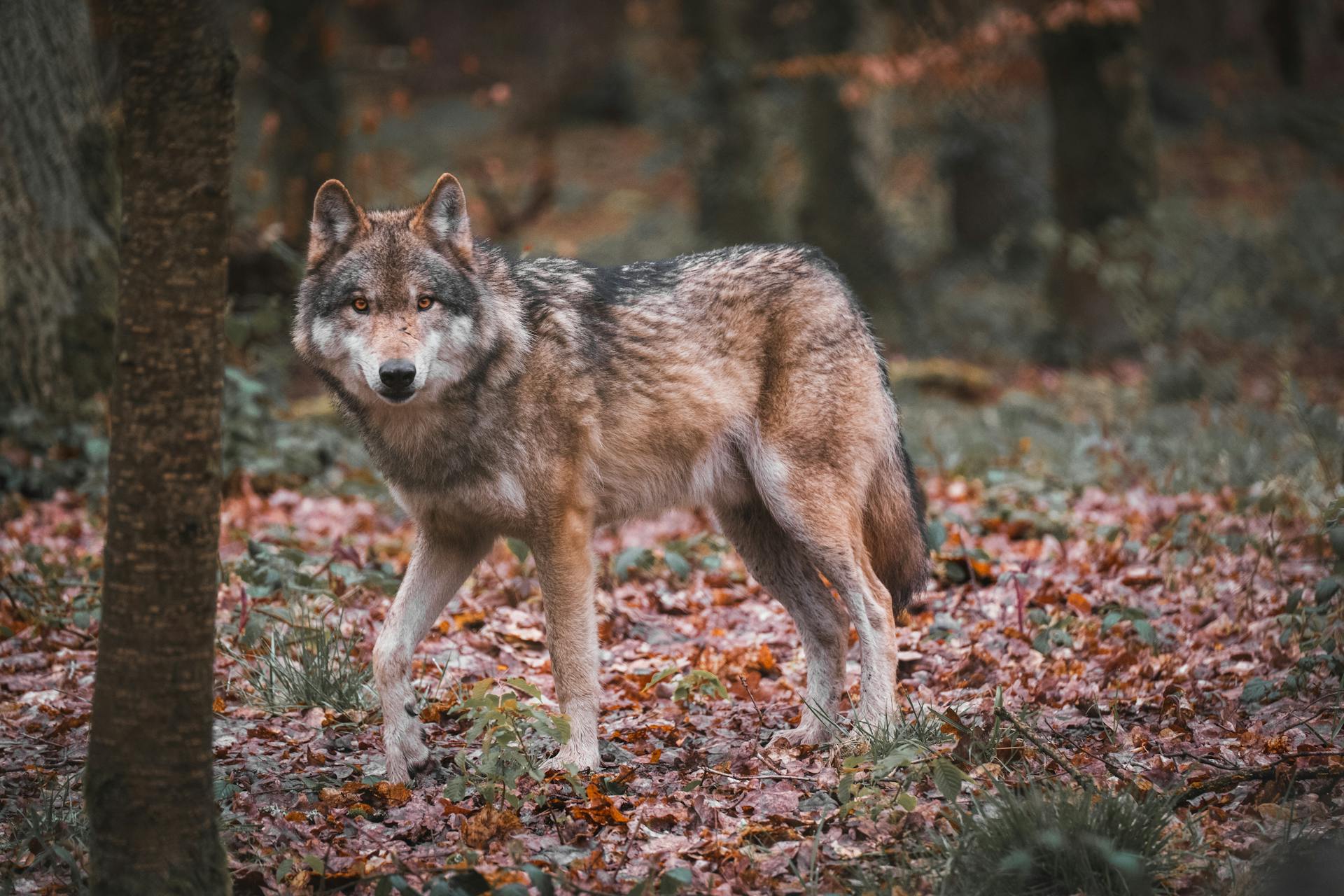
Alpha dog breeds are known for their strong will and independent nature. They require a firm and consistent owner who can establish clear boundaries and rules.
These breeds, such as the Siberian Husky and the Alaskan Malamute, have a strong prey drive and need plenty of exercise to keep them happy and healthy. They thrive on physical and mental stimulation.
Their high energy levels mean they need at least an hour of exercise per day, which can include running, hiking, or playing fetch. This helps burn off excess energy and prevent destructive behavior.
In addition to exercise, alpha dog breeds also need mental stimulation to prevent boredom and stress. This can be achieved through obedience training, puzzle toys, and scent work.
A unique perspective: Alpha Dog Names
Understanding Alpha Dogs
Dogs exhibit alpha dog behavior due to their pack mentality, which is a leftover from their wild wolf ancestors. This mentality makes them extremely loyal to their human owners.
A dog's personality is shaped by factors like size, breed, and environment, leading to varying levels of dominance and submission. Some dogs are naturally more dominant, while others are more submissive.
In a multi-dog household, a dominant dog will often rule over a submissive dog, but disruptions to this hierarchy can cause conflicts. These disruptions can be triggered by introducing a new dog, a puppy growing up, or a previous alpha dog getting older or dying.
To spot an alpha dog, look for signs like jealousy when you give attention to another dog, being the first to leave when opening the door, and stealing or hoarding chew bones or dog toys.
Here are some common signs of alpha dog behavior:
- The dog quickly becomes jealous if you give attention to another dog.
- Only one dog sleeps in a coveted spot like a soft sofa.
- When opening the door, the dog is the first one that leaves.
- The dog will steal, hide, or hoard any chew bones or dog toys and not let other dogs play with them.
- No other dogs will stare at the alpha dog.
- The alpha dog will generally mount submissive female and male dogs.
Establishing yourself as the alpha "dog" within the pack can significantly help, especially in multiple dog households where the hierarchy can get complex.
Managing Alpha Dog Behavior
Establishing yourself as the alpha "dog" within the pack can significantly help with alpha dog behavior issues.
Intriguing read: Alpha Female Dog Characteristics
You can spot a submissive dog, but identifying the alpha dog can be trickier.
Some signs of alpha dog behavior include becoming jealous if you give attention to another dog, stealing, hiding, or hoarding chew bones or dog toys, and mounting submissive dogs.
A new dog or pet introduced to your home can cause social unbalance in your pack and lead to alpha dog behavior issues.
Puppies reaching adolescence (typically between 6 to 12 months of age) can also challenge the alpha dog due to rising testosterone levels in males.
Ignoring the dominant dog or treating all dogs equally without paying special attention to the alpha dog can disrupt the hierarchy and lead to conflicts.
To reestablish pack position, focus on paying special attention to the dominant dog and maintaining a consistent routine.
Here are some common situations that can cause social unbalance in your pack:
- A new dog or pet is introduced to your home.
- A puppy reaches adolescence.
- A dog reaches social maturity.
- The reigning alpha ages, becomes weak, or dies.
- You ignore or don't pay special attention to the alpha dog.
- You change certain routines that disrupt the hierarchy.
- You pay attention to another dog or pet rather than the alpha.
By understanding these situations and taking steps to maintain a stable hierarchy, you can help reduce alpha dog behavior issues and create a more harmonious multi-dog household.
Training and Observation
Establishing yourself as the pack leader is crucial in managing alpha dog behavior. This can be achieved by setting clear rules and boundaries, and consistently enforcing them.
Housebreaking training for dogs can be a good solution to address alpha dog behavior issues. By establishing a routine and sticking to it, you can help your dog understand what is expected of them.
To spot the alpha dog, you need to read their body language carefully. Some signs of alpha dog behavior include becoming jealous if you give attention to another dog, or only allowing one dog to sleep in a coveted spot.
Recognizing Dog Behavior Signs
Recognizing dog behavior signs can be a challenge, but understanding the signs of alpha dog behavior can help you identify potential issues early on. Some alpha dog behavior is good and not necessarily aggressive, but it's essential to know the signs to maintain a harmonious household.
Dogs can exhibit alpha dog behavior depending on the situation, and their ancestors' pack mentality still carries over today. Most dogs see their human owner as the pack leader, which leads to extreme loyalty.
A dog with a more naturally dominant personality will rule over a submissive dog, especially if both dogs view their owner as the pack leader. Disruptions to this hierarchy can cause conflicts.
Some common examples of disruptions to the hierarchy include introducing a new dog or animal into the home, your puppy growing up and producing more testosterone, or a previous alpha dog getting older or dying. Ignoring or not paying special attention to the alpha dog can also cause issues.
To spot the alpha dog, read their body language, as it can indicate dominant and aggressive behaviors. A dog that quickly becomes jealous if you give attention to another dog is a sign of alpha dog behavior.
Here are some additional signs of alpha dog behavior:
- The dog is the first one to leave when opening the door.
- The dog will steal, hide, or hoard any chew bones or dog toys and not let other dogs play with them.
- No other dogs will stare at the alpha dog.
- The alpha dog will generally mount submissive female and male dogs.
By recognizing these signs, you can take steps to establish yourself as the alpha "dog" within the pack and maintain a harmonious household.
Observe Magical Trainers
Observing Magical Trainers can be a fascinating experience, especially if you're interested in learning about the art of magic. Magical trainers often have a deep understanding of the intricacies of magic and can provide valuable insights to their students.
Magical trainers typically have extensive experience in the field, with some having spent decades honing their skills. They often have a unique teaching style that caters to the individual needs of each student.
Frequently Asked Questions
Do dogs sleep with the alpha human?
Dogs often sleep next to their human companions, indicating trust and a desire for security and comfort. This behavior suggests a strong bond between dog and owner, where the human is perceived as a source of safety and comfort.
Sources
Featured Images: pexels.com


